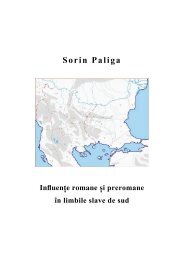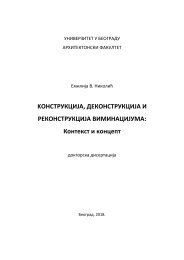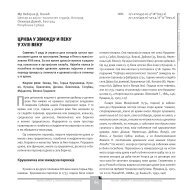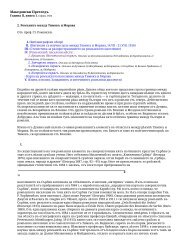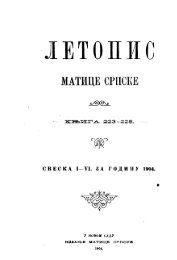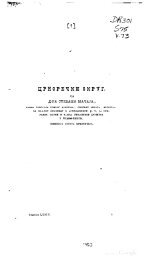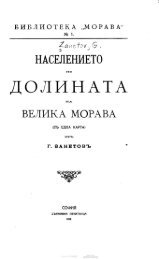The Construction of National Identity and its Challenges in Post-Yugoslav Censuses
Create successful ePaper yourself
Turn your PDF publications into a flip-book with our unique Google optimized e-Paper software.
874 Social Science Quarterly<br />
<strong>Censuses</strong> are tools to make, reaffirm, <strong>and</strong> also reject identities. <strong>The</strong>y provide crucial data,<br />
<strong>and</strong> allow for states to categorize their citizens. <strong>The</strong>ir importance has <strong>in</strong>creased with the<br />
rise <strong>of</strong> the modern state <strong>and</strong> <strong>its</strong> needs, which range from economics to taxation. It is also a<br />
major logistical enterprise that reaffirms the state <strong>in</strong> <strong>its</strong> capacity. A U.N. study notes: “<strong>The</strong><br />
traditional census is among the most complex <strong>and</strong> massive peacetime exercises a nation<br />
undertakes” (U.N., 2008:23).<br />
Census takers <strong>in</strong> modern <strong>and</strong> colonial states sought to recreate a complete <strong>and</strong> comprehensive<br />
picture not only to govern better, but also to impose <strong>and</strong> normalize certa<strong>in</strong><br />
categories <strong>of</strong> identity. As Benedict Anderson notes, colonial censuses <strong>in</strong>troduced racial, or<br />
ethnic, categories that were not just part <strong>of</strong> “divide-<strong>and</strong>-rule” strategies, but also were born<br />
out <strong>of</strong> a genu<strong>in</strong>e, if misguided, desire to underst<strong>and</strong> <strong>and</strong> to categorize (2008:164–66).<br />
In some cases, population counts <strong>in</strong> Balkan nation states served to legitimize compet<strong>in</strong>g<br />
territorial claims, as can be seen <strong>in</strong> the censuses conducted <strong>in</strong> the Ottoman-ruled Macedonia<br />
<strong>in</strong> the early 20th century (Yosmaoğlu, 2014:129–68). Whether their purpose is benign or<br />
manipulative, censuses require clear, measurable categories that allow for the aggregation<br />
<strong>of</strong> a large number <strong>of</strong> citizens. Most <strong>of</strong> the questions censuses ask, from a respondent’s<br />
household size, to a respondent’s level <strong>of</strong> education, or pr<strong>of</strong>ession, might be <strong>in</strong>trusive for<br />
an <strong>in</strong>dividual, but not necessarily controversial. When it comes to identity categories,<br />
however, markers such as religion, language, <strong>and</strong> ethnicity <strong>in</strong>troduce a significant element<br />
<strong>of</strong> subjective choice. It is at this juncture <strong>of</strong> a seem<strong>in</strong>gly objective exercise <strong>and</strong> the subjective<br />
nature <strong>of</strong> identity that the controversies <strong>of</strong> census tak<strong>in</strong>g are most pronounced. As Simon<br />
<strong>and</strong> Piché have noted, “[t]he statistical representation <strong>of</strong> diversity is a complex process<br />
which reveals the foundations <strong>of</strong> societies <strong>and</strong> their political choices. Thus there is a gap<br />
between the apparent ethnic <strong>and</strong> racial diversity <strong>in</strong> most countries <strong>in</strong> the world <strong>and</strong> the<br />
way these societies perceive themselves <strong>and</strong> are portrayed <strong>in</strong> <strong>of</strong>ficial <strong>and</strong> social statistics”<br />
(2012:357). Consider<strong>in</strong>g the ambiguity <strong>of</strong> identity we know to be case <strong>in</strong> all societies, an<br />
<strong>in</strong>evitable tension arises between the fiction <strong>of</strong> steady, objective categories, <strong>and</strong> the reality<br />
where belong<strong>in</strong>g varies <strong>and</strong> does not necessarily fit <strong>in</strong>to easily identified boxes.<br />
We need to be careful neither to fall <strong>in</strong>to the trap <strong>of</strong> uncritically accept<strong>in</strong>g the logic <strong>of</strong><br />
ethnic numbers, nor to simply dismiss them, or those who “roll out census results <strong>and</strong><br />
maps” as primitive <strong>and</strong> primordial (Jansen, 2005:51). A two-fold strategy allows us to<br />
take censuses <strong>in</strong>to account without fall<strong>in</strong>g <strong>in</strong>to the trap <strong>of</strong> <strong>in</strong>advertently attribut<strong>in</strong>g a fixed<br />
quality to them. First, we need to accept the political use (<strong>and</strong> abuse) <strong>of</strong> numbers. As<br />
such, they are used for barga<strong>in</strong><strong>in</strong>g over compet<strong>in</strong>g claims, just like history (<strong>and</strong> <strong>its</strong> myths),<br />
<strong>in</strong>ternational support, <strong>and</strong> victims on one’s side. Second, even if census results are snapshots<br />
that grant us an admittedly reductionist view <strong>of</strong> a more complex reality, they can serve as a<br />
useful tool to determ<strong>in</strong>e both the categories <strong>of</strong> the state <strong>and</strong> the response <strong>of</strong> <strong>its</strong> citizens.<br />
<strong>The</strong> Argument<br />
This article argues that censuses are an important site <strong>of</strong> contestation that establish,<br />
enforce, <strong>and</strong> negotiate national identities, which are <strong>in</strong> turn either accepted or rejected. By<br />
exam<strong>in</strong><strong>in</strong>g both the process <strong>of</strong> category mak<strong>in</strong>g, <strong>and</strong> the response <strong>of</strong> citizens, the article<br />
seeks to highlight not only the production <strong>of</strong> identity boundaries, but also the response<br />
<strong>of</strong> citizens. In do<strong>in</strong>g so, it seeks to explore the follow<strong>in</strong>g hypotheses. First, censuses are<br />
politicized <strong>and</strong> the categorization <strong>of</strong>, <strong>and</strong> responses to, choices available to respondents<br />
are significant for the state <strong>and</strong> the organizations (such as parties) that represent ethnonational<br />
groups. Second, <strong>in</strong>dividuals have a choice to confirm or reject proposed identity<br />
categories. <strong>The</strong> scale <strong>of</strong> rejection is expected to result from two factors: (a) the availability <strong>of</strong>






